Sudan
The truce is being held for the second day in Khartoum on Monday, as Geneva hosts an international conference on humanitarian aid to Sudan, which has been ravaged for more than two months by fighting between rival generals.
Since Sunday morning, air raids and artillery bombardments have ceased on the capital, whose inhabitants are surviving in sweltering heat, without electricity and often without running water.
On Monday, the second day of the 72-hour truce due to end at 06:00 local time on Wednesday, no fighting could be heard in Khartoum, according to several residents interviewed by AFP.
The army, commanded by General Abdel Fattah Al-Burhane, and the paramilitaries of General Mohamed Hamdane Daglo's Rapid Support Forces (RSF) are respecting this new truce, whereas a dozen others had been systematically violated.
Both sides have pledged to cease all movements to allow humanitarian aid into this East African country, one of the poorest in the world. But medicines and foodstuffs are still in short supply, as humanitarian organizations are finding it difficult to move around and airfreight consignments are often blocked at customs.
The fighting that broke out on 15 April has left more than 2,000 people dead, according to the NGO ACLED, and more than 2.2 million displaced and refugees, according to the UN.
Humanitarian access hampered
"More than 100 visa applications from around thirty organizations are still pending", William Carter, director of the Norwegian Refugee Council in Sudan, said on Monday.
"It's clear that humanitarian access is being hampered," he said. "We've had a team of 20 people ready to go for over a month, and we could have helped 200,000 displaced people".
Even before the war, one in three Sudanese suffered from hunger. Today, 25 million Sudanese, almost half the population, need humanitarian aid to survive, according to the UN.
The aim of the Geneva conference, sponsored by Saudi Arabia, is to release funds to finance this aid, at a time when UN agencies say they have not received a fifth of the funding they need.
These agencies must help Sudan's neighbors, all of which are plunged into economic crisis or violence, to receive the refugees.
They must come to the aid of Sudanese towns where thousands of displaced people are piling up, exacerbating the need for food and water, and help doctors deal with the epidemics that are expected with the arrival of the rainy season.
In the combat zones, almost all the hospitals are out of action, having been bombed or occupied by the belligerents. Those that remain open have run out of medicines and some of the doctors have fled.
In addition to Saudi Arabia, Qatar, Egypt, Germany, the UN's humanitarian agency (Ocha), the European Union and the United Nations High Commissioner for Refugees (UNHCR) are to take part in the operation.
For several weeks, Saudi Arabia and the United States mediated negotiations between the two camps with a view to reaching a ceasefire, without succeeding in convincing the two generals fighting for power.
"Disaster" in Darfur
The situation is particularly worrying in Darfur, a vast region in western Sudan, where soldiers, paramilitaries, tribal fighters and armed civilians are clashing.
Reports of large-scale violence against civilians are multiplying, and according to the UN, more than 150,000 people have fled to Chad.
Already devastated in the 2000s by a war that, according to the UN, left some 300,000 people dead and nearly 2.5 million displaced, Darfur is heading for a new "humanitarian disaster", warned the UN, saying that the violence in the region could constitute "crimes against humanity".
In a joint statement, the UN, the African Union and Igad, the East African bloc to which Sudan belongs, said they were "deeply concerned about the heavy civilian toll" and "massive destruction" in the country.
These organizations sounded the alarm over Darfur where, they said, "the conflict now has an ethnic dimension, with targeted attacks based on people's identities and population displacements".



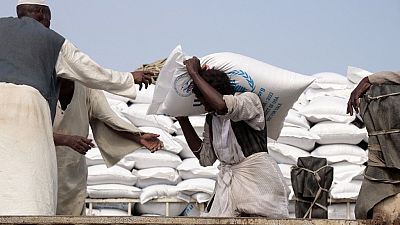

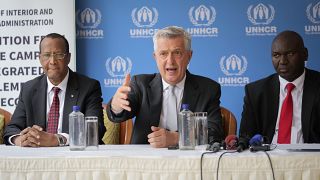
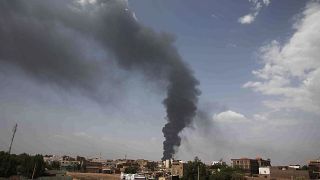
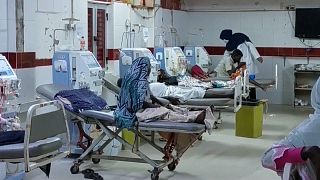
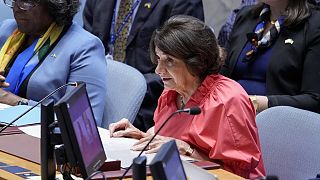
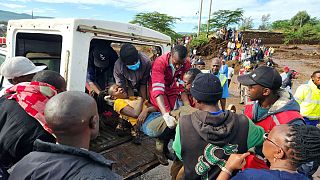
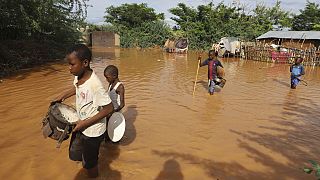
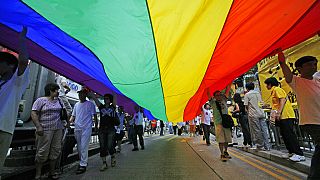
01:42
Francis prays for Haitians and “peoples suffering from war and violence”
01:25
UN calls for de-escalation as fighting intensifies for control of North Darfur state capital
01:01
Israel-Hamas war: Humanitarian aid parachuted into northern Gaza
01:46
Donors pledge $2.1 billion to aid war-stricken Sudan - Macron announces
01:19
Sudan: over 25 million people facing humanitarian crisis, says UNHCR
01:26
After two months of blockage, food aid deliveries resume in Darfur- UN